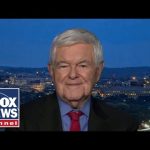In the latest round of media interviews, it seems the liberal narrative machine has cranked up a notch, especially when critiquing former President Donald Trump. After a recent exchange with NBC’s Kristen Welker, the media seemed eager to paint Trump as someone who disregards the very fabric of the Constitution. This time, it wasn’t just the usual grumbling about his policies; it leaned into the sensational, complete with alarm bells ringing over claims of a looming “constitutional crisis.”
During the interview, Welker posed questions concerning Trump’s allegiance to the Constitution and the Supreme Court. Trump gave a classic non-lawyer response. While he acknowledged his team of brilliant attorneys working diligently to navigate the legal waters, the media twisted his words into a sensational headline, suggesting he was willing to defy the law. This isn’t the first time the press has tried to unravel Donald Trump’s thoughts and intentions, and also probably not the last. Yet, they seem to keep missing the mark!
The truth is, Trump did assert that his lawyers are following the Supreme Court’s guidance, even if Welker and her colleagues seemed to have a different script in mind. Critics of Trump often overlook the fact that he relies heavily on legal experts when it comes to intricate questions about constitutional law. This was bound to happen in an interview setting where the reporter’s eagerness to pin down Trump led to interruptions and a theatrical battle of wits rather than a straightforward discussion.
Moreover, the media’s response to Trump’s comments became a performance piece rather than an objective analysis. Some headlines screamed about Trump’s apparent ignorance regarding constitutional obligations, sparking debates across news platforms. However, audiences might wonder: when did it become a crime not to know every detail of the law? In an age where verbal snags are instantly reported and dissected, it’s almost as if there’s an unwritten rule that politicians must be flawless or face relentless scrutiny. If the media sounds more like sleuths than journalists, could it be because they are less interested in the truth and more invested in reinforcing a narrative of their own?
As the national discourse tumbles into debates about tariffs and price increases, Trump’s delivery on economic issues is also getting pulled in different directions. In one amusing moment, he described how some items’ prices are predicted to rise due to tariffs but that in the long run, Americans stand to benefit significantly. The following day, headlines leaned toward a doomsday view: the Grinch of Christmas pricing was coming for Americans. Watching the media’s beloved tales of materialism clashing with their “anti-consumerism” narrative has almost become a comedic spectacle worth tuning in for, hinting that perhaps the critics are casting shadows more than they are revealing truths.
Finally, the ongoing tension between Trump and the media reflects a broader concern. As public trust in journalism dwindles—plummeting lower than the approval ratings for Congress—it’s apparent that many in the media might want to rethink their approach. While Trump continues to face challenges in explaining his policies under the media’s microscope, the press is increasingly becoming the punchline. Maybe, in their quest for the next scoop, they missed the bigger picture: a public yearning for unbiased information that empowers rather than hysterically entertains. As the circus continues, it will be fascinating to see how Trump and the media navigate this complicated dance.




